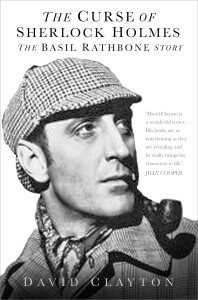 David Clayton’s The Curse of Sherlock Holmes: The Basil Rathbone Story is a look at a man defined by a character he felt was at best confining. Indeed given that Basil never really managed to recover the same level of star power once he left Sherlock Holmes for a while, one could argue it destroyed his career.
David Clayton’s The Curse of Sherlock Holmes: The Basil Rathbone Story is a look at a man defined by a character he felt was at best confining. Indeed given that Basil never really managed to recover the same level of star power once he left Sherlock Holmes for a while, one could argue it destroyed his career.
The man’s early life, down to his birth name of Philip St. John Basil Rathbone, are discussed in some detail as is his taste for the dramatic. The first marriage he had, which led to his status as an early divorced star in Hollywood,is as well, a detail that was often glossed over in early biographical works.
Details relating to the career of Basil Rathbone come freely and quickly, both before and after playing the great detective. These range from bit parts as he found his footing, to commercials and b-movies produced at the end of his life in a desperate desire to make ends meet. The economics of Rathbone’s career are discussed in surprisung detail, and that leads into one of the many darker aspects of the book.
One detail that gains focus in disturbing manner is Basil Rathbone’s second wife, Ouida. Ouida was a bit of an actress in her time, but far preferred to host parties and spend. She quit acting believing that Basil would be the better moneymaker. She pushed him forther professionally yes, and also spent his money at a stunning clip. She helped encourage and ensure a rift opened between Basil Rathbone and the son he had during his first marriage, a rift that was not healed in their lifetimes.
This is not to say she is depicted as the cause to every fault Rathbone had, but rather to note that in earlier biographies as well as a Rathbone autobiography she was not given nearly so negative a depiction. The information is, all the same, given dispassionately, as a fact more than an invective, and as a result is more sobering than anger inducing.
There is a noticeably section of photographs. Some are images from Rathbone’s films and nice to look at but not exceptionally hard to find. Others are rarer, coming from family archives or older stage productions. These will be more interesting and educational to a reader already somewhat experienced with the work of Rathbone. It is, in any event, a pleasant inclusion.
On the Holmesian front, Rathbone’s friendship with Nigel Bruce is discussed in some detail, ranging between the time they were performing together on screen and radio as the great detective and his loyal friend all the way to Rathbone’s reaction to the passing of a man who had become a dear friend. They are touching moments that bring a special humanity to a period that is often restricted to all that audiences remember of the two actors.
Details are given about the failed Sherlock Holmes play Rathbone attempted, and Ouida’s part in it. The man’s thoughts upon the character are given in his own words, illustrating the path of like to hate to indifference that actor man followed with his signature character.
Overall The Curse of Sherlock Holmes is an excellent if slightly tragic biography. There is little new information for the Sherlock Holmes scholar, but much to learn about the life of perhaps the most famous man to play him. It is certainly a good read and while it might not make the reader love Basil Rathbone, it should help them to understand him better.
(The History Press 2020)
